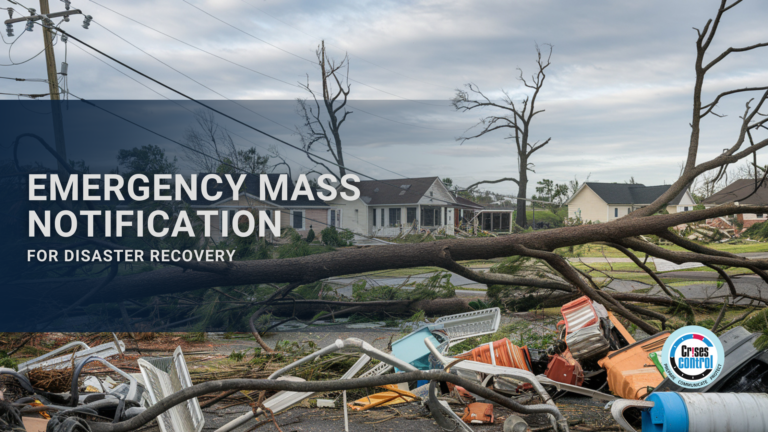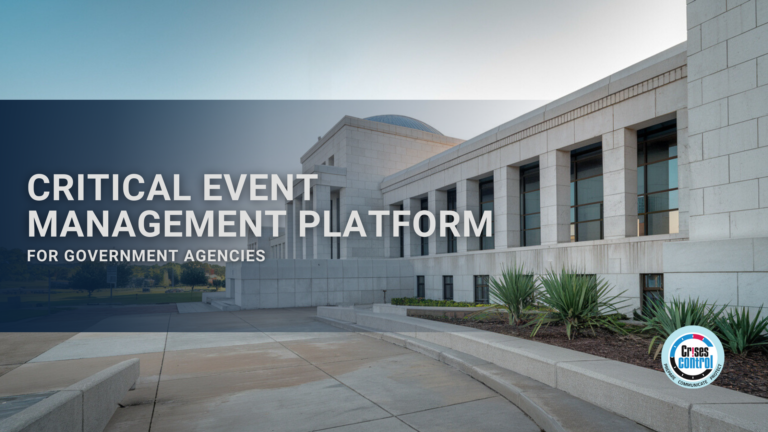
Unlocking the Power of Communication: The Benefits of a Mass Notification System
Written by Anneri Fourie | Marketing Executive In a world where emergencies can strike at any moment, clear and timely communication is essential for ensuring safety and effective response. Organisations often find themselves facing unexpected crises that can jeopardise operations, tarnish

Enhancing Oil and Gas Site Security with Real-Time Mass Notification Systems
Written by Ikram Tassi, Marketing Why Site Security in Oil and Gas Requires a Real-Time Approach The oil and gas industry operates in high-stakes, remote

How Real-Time Alerts Can Revolutionise School Safety with Crises Control
Written by Ikram Tassi, Marketing Schools today face an increasing variety of emergencies, from severe weather to security threats, making rapid and efficient responses essential.

Enhancing Public Safety: How a Mass Notification System Transforms Emergency Communication for Government Agencies
Written by Anneri Fourie | Marketing Executive Emergencies can strike without warning—from severe weather events to public health crises—and government agencies face immense pressure to

Why Your Business Needs a Critical Alert System for Rapid Response and Resilience
Written by Sonny Sehgal | Board Member Every business faces the risk of sudden disruptions, from severe weather events and cyber-attacks to equipment failures and

How Technology is Transforming Emergency Planning for Businesses: The Key to Staying Prepared
Written by Anneri Fourie | Marketing Executive In 2024, as we face unprecedented challenges and uncertainties, emergency planning has shifted from being a static checklist

How Emergency Communication Software Protects Your Workforce and Keeps Your Business Running
Written by Shalen Sehgal | CEO Where crises seem to emerge at a moment’s notice, businesses must be prepared to respond quickly. One of the

Emergency Notification Systems: The Lifeline for North American Businesses in Crisis
Written by Anneri Fourie | Marketing Executive In today’s unpredictable world, businesses across North America face a growing number of crises that can disrupt operations,

How an Emergency Notification System Ensures Workplace Safety Across the Middle East
Written by Anneri Fourie | Marketing Executive In the Middle East, industries like oil and gas, aviation, and construction operate under constant pressure. Every day,

The Critical Role of Emergency Notification Systems in Saudi Arabia’s Oil and Gas Industry
Written by Anneri Fourie | Marketing Executive The oil and gas industry is the backbone of Saudi Arabia’s economy and plays a key role in

The Role of an Emergency Notification App in Business Continuity: How to Stay Operational During Crises
Written by Anneri Fourie | Marketing Executive Businesses face constant threats from unexpected events like natural disasters, cyberattacks, equipment failures, or even global pandemics. When

How Emergency Mass Notification Systems Drive Faster Disaster Recovery in North America
Written by Anneri Fourie | Marketing Executive Disasters are becoming more frequent and more severe, putting businesses across North America at greater risk. Whether it’s

Empowering Government Response Through Critical Event Management Platforms
Written by Anneri Fourie | Marketing Executive Government agencies face a variety of challenges—from natural disasters and public health emergencies to civil unrest and cybersecurity

Protecting Students: How Emergency Alert Software Enhances Campus Safety
Written by Shalen Sehgal | CEO As educational institutions grow in size and complexity, ensuring the safety of students and staff has become a top

Why a Mass Notification System is Critical for Employee Safety: Safeguard Your Organisation in a Crisis
Written by Anneri Fourie | Marketing Executive Organisations face various potential crises—from natural disasters and cyberattacks to health emergencies and even terrorism. These situations can







